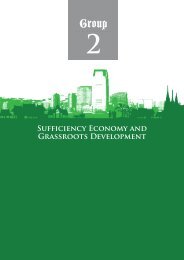Conflict, Legitimacy and Government Reform: Equitable Allocation of ...
Conflict, Legitimacy and Government Reform: Equitable Allocation of ...
Conflict, Legitimacy and Government Reform: Equitable Allocation of ...
Create successful ePaper yourself
Turn your PDF publications into a flip-book with our unique Google optimized e-Paper software.
government to pursue public policies to mitigate inequality. 3<br />
Panel Discussion<br />
In Thail<strong>and</strong>, groups led by a small number <strong>of</strong> people could usurp<br />
power <strong>and</strong> resist changes. During the past few decades, monopolized<br />
powers were concentrated in the centralized bureaucracy <strong>and</strong> commercial<br />
military systems. (Riggs, 1964; Chai-Anan, 1982; Chambers, 2009)<br />
Even after a parliamentary system was developed, the system has been<br />
controlled by a small number <strong>of</strong> businessmen <strong>and</strong> retired bureaucrats<br />
(both civilian <strong>and</strong> military alike). The military still plays a major role in<br />
Thai politics, can stage a coup to abolish a constitution <strong>and</strong> elected<br />
parliament, <strong>and</strong> impede sustainable democratization. No one in the<br />
power center wants to solve inequality problems. Those who desire to<br />
change this never got a chance to enter the power center. There might be<br />
some discussion about inequality issues in an economic <strong>and</strong> social<br />
development plan like the eighth plan. Later, there would be no<br />
implementation <strong>of</strong> any public policy to tackle inequality problems in<br />
earnest, not a single policy. In other words, we still lack a political will.<br />
How can we progress?<br />
I’ll leave political will for the time being <strong>and</strong> turn to review the<br />
mechanisms that can help mitigate income inequality, that is, taxation<br />
system or revenue generated from taxes <strong>and</strong> public expenditure (resource<br />
allocation). Collectively, they are referred to fiscal policy.<br />
A fair society must have a taxation system that is acceptable <strong>and</strong> fair.<br />
However, it doesn’t mean that taxes must be collected from the rich just<br />
to give it to the poor. Since the rich are wealthier, they can pay more,<br />
that is, status-based taxation while gained benefits must not be less than<br />
others. This means the rich must be taxed at an acceptable fair ratio.<br />
3 In Thail<strong>and</strong>, labor unions succeeded in pressuring the government to pass the<br />
social security act that applies to workers in formal sectors in 1988 after 30 years <strong>of</strong><br />
campaigning. However, since the scheme covers only a small portion <strong>of</strong> workers, it has<br />
not contributed much to income distribution.<br />
51














